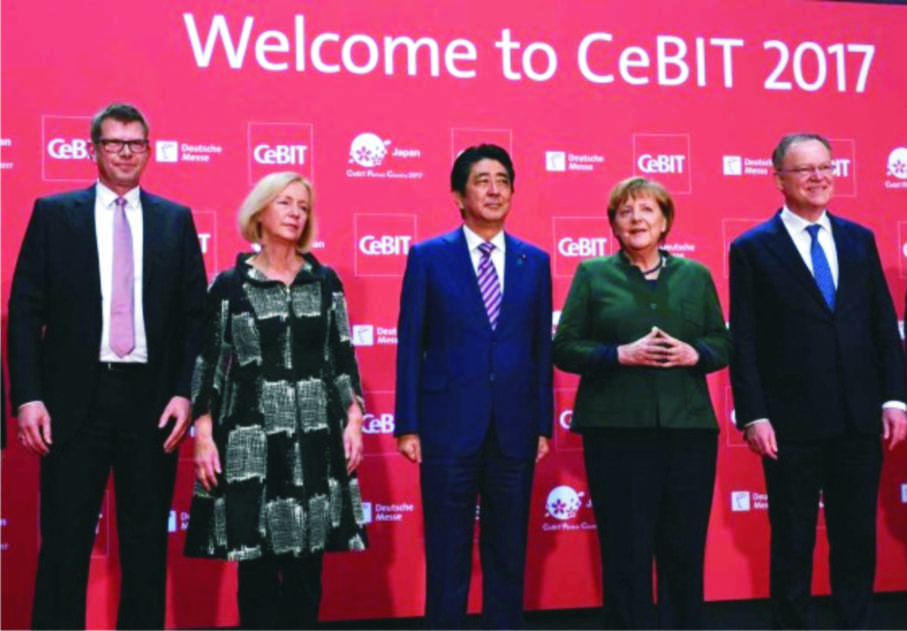By MKPE ABANG, Hannover, Germany
Convinced that high technology and innovation hinged on digitisation are key to a prosperous world, hundreds of thousands of technology experts, governments and industry leaders from across the world have converged on Hannover, Germany as this year’s CeBIT gets underway from March 20, 2017.
Flaunting country pavilions, intimidating, captivating and futuristic digital technologies in company booths, exhibitors ranging from countries to multinational companies, filled the Hannover Fairgrounds, regarded as the largest in the world, as the five-day event gets off to an impressive start.
And, to give meaning to the event, no less personalities than the German Chancellor, Dr. Angela Merkel and the Japanese Prime Minister, Mr. Shinzo Abe, premiered the event on Sunday night, presenting previews of technologies that would dominate the event throughout the week.
CeBIT, the largest and most internationally represented technology show, and considered the barometer of current trends and a measure of the state of the art in information technology, made its debut in 1970 and has for decades grown to become a dominant factor in the direction of evolving technologies as the “laboratory of hi-tech” for the world.
For this year’s edition, over 3,000 companies are showcasing everything digital, to determine the direction and set the tone for the entire world to follow in the digitisation trend that would now dominate global activities.
Japan’s Shinzo Abe, for instance, found the event most fitting to promote his idea of Japan’s Society 5.0; the concept from Tokyo involves taking advantage of the power of digitisation to create smarter and more efficient ways of living and working, and to better face the challenges of an ageing population.
Japan is CeBIT 2017’s Partner Country; and, Hitoshi Masuda from Japan’s External Trade Organisation explains:
“Japan has been a manufacturing country. Manufacturing itself is very important. So connecting the real world of manufacturing and the virtual world of information technology, that’s the key, we think.”
With innovations in artificial intelligence, the Internet of Things, autonomous vehicles, drones, and robotics on display here, that vision of a smarter world seems more credible, as the rate of digitisation accelerates.
Some 120 exhibitors from Japan alone are represented in Hanover.
“We do see that innovation is no longer linear, as it used to be in previous years,” Hartwig von Sass, CeBIT spokesman stated. “Now it’s exponential development, technical developments converge together, and develop a disruptive power in many sectors of the economy.”
It is about “millions of people who do not yet know what they are expecting,” Merkel explains, saying she would not take the policy in the new era of digitisation to address the industry; rather, one would have to adapt the education system, among other things, to lifelong learning.
Europe is often slow in digitisation, admitted Merkel. “Twenty-eight Member States must, of course, contribute,” she said. “But we feel that the world is at a high pace, and with Japan we have a friend who makes this high pace a reality.”
Europe and Germany could learn from Japan how to approach technology openly.
Abe also spoke of the social implications of digitalisation: “We must not create a situation in which only certain people accumulate wealth or benefit the lawless.”
Abe emphasised that Japan is not afraid of technologies like the artificial intelligence: “There is no such fear in Japan that the machines could replace people.”
Calling for rapid standardisation in digital technology Merkel said: “We still have a lot to do here,” echoing the desire for a free-trade agreement with Japan.
The President of Bitkom, Thorsten Dirks, expressed the hope that digital change could change society for the better. “Digitisation leads to democratisation, integration and exchange, transparency and participation”.
Affirming that this is time to remember these coordinates of an open and pluralistic society, he charged:
“Let us break down borders with digitalisation and thus set a sign against the cleavages in our world,” said Dirks, who is also the telecom operator of Telefónica.
This year, CeBIT is promoting new technologies such as robots, artificial intelligence or drones in concrete application examples.
All aspects of the digital transformation are on display and under debate at the CeBIT 2017 conferences with exhibitors from over 70 countries displaying the best of digital technologies.
The conferences are dedicated to providing a 360° overview of the digital industry’s four core markets: IT, Telecommunications, Digital Media and Consumer Electronics.
Noted industry figures and researchers from across the globe have been invited to speak this year, as has been the case in previous events, on the latest relevant trends and innovations as well as their impact on society and the working world, thereby laying the foundation for developments that are to drive global transformations.

